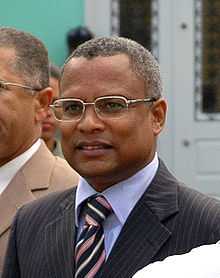José Maria Neves
| José Maria Neves | |
|---|---|
 | |
| Prime Minister of Cape Verde | |
| Incumbent | |
| Assumed office 1 February 2001 | |
| President | António Mascarenhas Monteiro Pedro Pires Jorge Carlos Fonseca |
| Preceded by | Gualberto do Rosário |
| Personal details | |
| Born | 28 March 1960 Santa Catarina, Overseas Province of Cabo Verde, Portugal |
| Political party | African Party for the Independence of Cape Verde |
| Alma mater | Getúlio Vargas Foundation |
José Maria Pereira Neves (Portuguese pronunciation: [ʒuˈzɛ mɐˈɾiɐ pɨˈɾejɾɐ ˈnɛvɨʃ]; born March 28, 1960) is a Cape Verdean politician who has been the Prime Minister of Cape Verde since 2001. He is a member of the African Party for the Independence of Cape Verde (PAICV).
Career
Born on the island of Santiago,[1]“José Maria Neves became interested in the politics and government of Cape Verde as a teen-ager.”[2] “He was the leader of a nationalist youth organization during the country’s transition from Portuguese rule to independence and democracy in 1975.” [3] Part of his superior education was in the Getúlio Vargas Foundation in Brazil.
As a candidate for the party leadership at PAICV's September 1997 congress, he faced Pedro Pires;[4] Pires defeated Neves in the leadership election, winning 68% of the vote.[5] In May 2000, Neves—then serving as President of the Santa Catarina Town Council—announced that he would seek the PAICV presidency again at the June 2000 party congress; Pires was leaving the PAICV presidency in anticipation of his candidacy in the next year's national presidential election.[6]
While acknowledging the harmful effects of slavery and colonialism on Africa, Neves said in December 2006 that African leaders were primarily responsible for the continent's present-day problems, and that they "must assume their responsibility to develop a clear strategy for Africa's future that takes advantage of all of its human capabilities and natural resources."[7] Neves is a supporter of European Union membership for Cape Verde.
From August 12 to August 16, 2005, he visited eight state capitals of Brazil including São Paulo, Rio de Janeiro, Goiânia, Recife, Maceió, João Pessoa, Natal and Fortaleza. He also received an audience from Brazilian President Lula da Silva on August 22.
A new government under Neves was announced on June 27, 2008, with six ministers joining the government and four ministers leaving it. Three of the new ministers were women, making it the first government in Cape Verde with a female majority (eight out of 15 portfolios).[8]
On 6 February 2011, he was elected to his third term by most Cape Verdean voters, thus reinforcing his party's influence in the Cape Verdean parliament.
References
- ↑ http://brown.edu/Administration/News_Bureau/2003-04/03-029.html
- ↑ http://brown.edu/Administration/News_Bureau/2003-04/03-029.html
- ↑ http://brown.edu/Administration/News_Bureau/2003-04/03-029.html
- ↑ "Cape Verde: Opposition party congress opens", Radio Renascenca, Lisbon (nl.newsbank.com), September 19, 1997.
- ↑ "Cape Verde: Former PM elected leader of main opposition PAICV party", Radio Renascenca, Lisbon (nl.newsbank.com), September 22, 1997.
- ↑ "Cape Verde: Town council leader to run for PAIGC party leadership", RDP Africa web site (nl.newsbank.com), May 29, 2000.
- ↑ "Africa 'stop blaming colonialism'", AFP (News24.com), December 22, 2006.
- ↑ "Profunda remodelação governamental em Cabo Verde", Panapress, June 27, 2008 (Portuguese).
External links
| Wikimedia Commons has media related to José Maria Neves. |
| Political offices | ||
|---|---|---|
| Preceded by Gualberto do Rosário |
Prime Minister of Cape Verde 2001–present |
Incumbent |
|